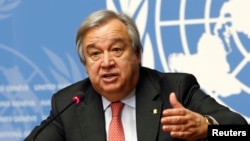Former Portuguese Prime Minister Antonio Guterres was unofficially selected Wednesday as the next U.N. secretary-general. He was expected to be officially endorsed in the coming days.
Following a decisive round of voting Wednesday in the Security Council, the veteran politician and diplomat prevailed with 13 votes in favor of his candidacy, none objecting and two votes of "no opinion."
"Today we have a clear favorite, and his name is Antonio Guterres," Russian Ambassador Vitaly Churkin announced in his capacity as council president. In an unexpected move, he was flanked at the microphone by all of the council's ambassadors.
"We've decided to go for a formal vote tomorrow at 10 a.m. We hope it can be done by acclamation," Churkin added.
Wednesday's round of informal straw polls was significant because for the first time, the five permanent, veto-wielding council members used color-coded ballots that signified vetoes of candidates. Guterres escaped the vetoes and received more than the minimum nine votes needed to prevail.
On Thursday, the council will formalize its decision in a vote and after that put the decision in a resolution. The council will then send its recommendation to the General Assembly, which is expected to rubber-stamp the Guterres selection.
"I think that we saw in the hearings, that the General Assembly organized, that António Guterres was an outstanding candidate, and that is why he has prevailed in this competition within the Security Council," British Ambassador Matthew Rycroft told reporters after the announcement.
Guterres, 67, was Portugal's prime minister from 1992 to 2002. He led the U.N. refugee agency from 2005 to 2015.
He told VOA in an interview during his campaign that he was running for the top U.N. job because he wanted to "create the conditions for solutions" to global challenges.
Gender, geography
At the U.N., there is a tradition of regional rotation to fill the secretary-general's post. Eastern Europe is the only group that has never had a turn, and it fielded a number of candidates this year in a bid to end that.
There was also a push by about a third of the member states to see a woman occupy the secretary-general's suite on the 38th floor of U.N. headquarters. But despite the talk of wanting a woman, the female candidates have mostly placed only in the middle to the bottom of the pack.
In Wednesday's vote, no other candidate escaped vetoes from the permanent members, effectively rendering their candidacies unviable.
Guterres will take over for Ban Ki-moon on January 1, 2017. He will serve for an initial five-year term, with the possibility of a second five-year term.
Antonio Guterres biography:
-Began his political career in 1974 when he joined the Portugal's Socialist Party.
-Worked his way up to become leader of the Socialist party in 1992 and was elected prime minister in 1995.
-Led the UN High Commission for Refugees from 2005 to 2015.
-Before entering into politics, Guterres studied electrical engineering and worked as a professor.
Results of the voting:
Antonio Guterres, Portugal — 13 yes, 0 no, 2 no opinion.
Miroslav Lajcek, Slovakia — 7, 6, 2, with 2 of the "no" votes coming as vetoes from permanent council members.
Vuk Jeremic, Serbia — 7, 6, 2, with 3 vetoes
Irinia Bokova, Bulgaria — 7, 7, 1, with 2 vetoes.
Helen Clark, New Zealand — 6, 8, 1, with 3 vetoes.
Susana Malcorra, Argentina — 5, 7, 3, with 1 veto.
Kristalina Georgieva, Bulgaria — 5, 8, 2, with 2 vetoes.
Danilo Turk, Slovenia — 5, 8, 2, with 4 vetoes.
Srgjan Kerim, Macedonia — 5, 9, 1, with 3 vetoes.
Natalia Gherman, Moldova — 3, 11, 1, with 3 vetoes.




